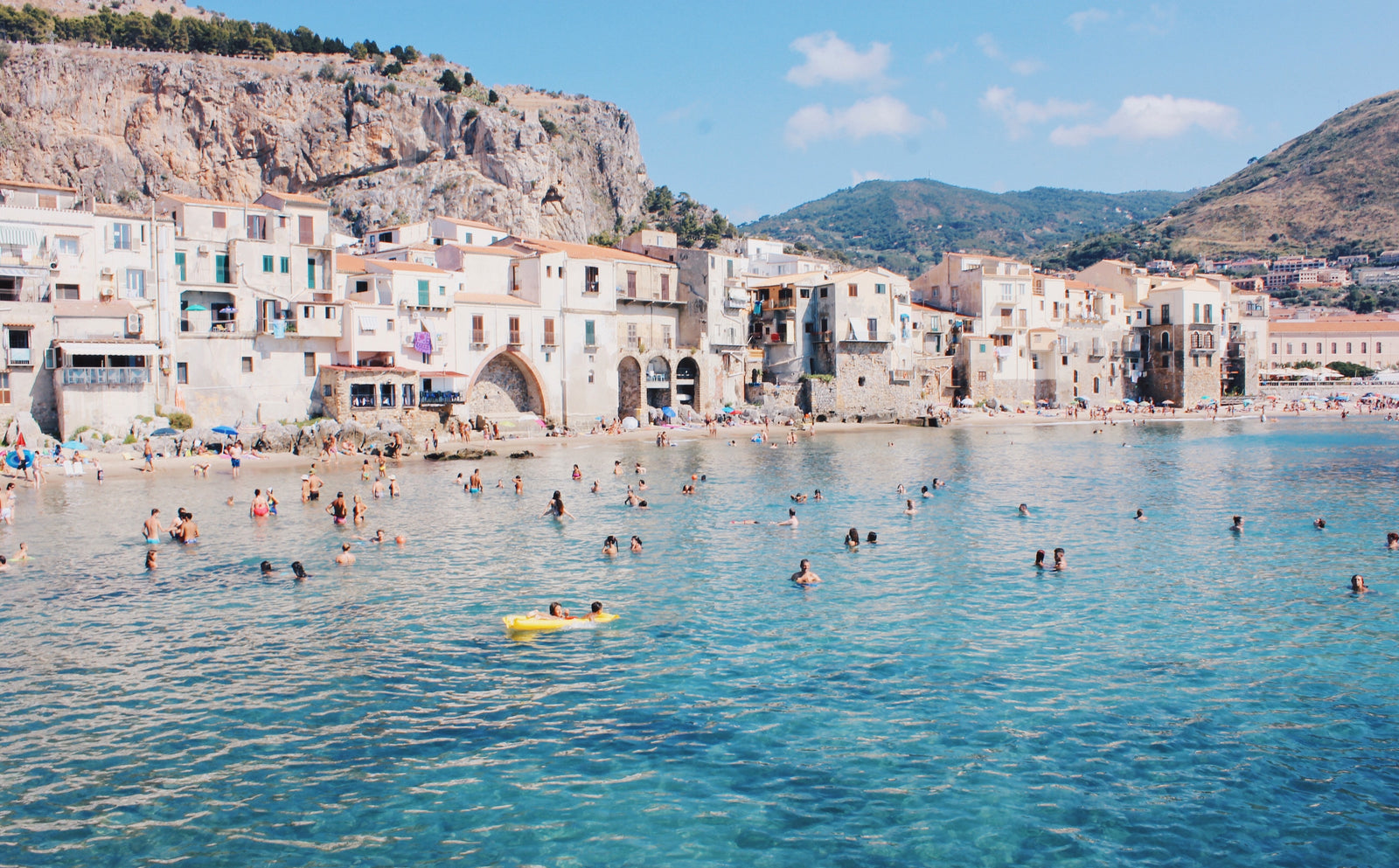Sicilia, or Sicily, has always been a fascinating region to visit with its rich and complex history. From ancient times this island has been the playground of different people and cultures. Its history is that of arts and wars, mythology and religion, philosophy and science, oppression and liberation, and the constant fight against poverty, corruption, and abuse. But then there are stories that give one hope, make one believe that we can overcome the odds and show other possibilities for positive outcomes.
This is the story that we are going to tell you with the wine selections for this month; of positive values like working hard to build a better environment from a corrupted one. Changes for the better are possible even starting with a glass of wine.
Elio Longobardi, Italian Wine Specialist
PlumpJack Wine & Spirits – Noe Valley
Centopassi
Centopassi is the winemaking division of Libera Terra (Free Land) cooperatives that cultivate Sicilian lands that have been confiscated from the mafia.
The name Centopassi (One Hundred Steps) comes from a movie made in 2000 by Italian director Marco Tullio Giordana. He also directed ‘La meglio gioventu’ (The Best of Youth) about Peppino Impastato, a young journalist and political activist from Cinisi, in the Palermo province, who was killed in 1978 by the mafia.
The Impastato family had a close relationship with the mafia, but as a teenager Peppino began to see what was wrong with that. Local bosses controlled the life of the community. Any business activity or any political decision of each town had to have the approval of the mafia families in control of the area. Peppino broke off with his family and started to get involved with the political leftist groups who were fighting the mafia.
Peppino knew those people very well having grown up among them and he started to denounce them in the articles he wrote and through the free radio station, Radio Aut, which he founded.
He was killed while campaigning to be elected to the city council. He got enough votes to win a seat but it was too late. One hundred steps was the distance from Peppino’s house to that of Gaetano Badalamenti, the mafia boss who ordered the killing.
Libera Terra’s guiding principle is always to stay true to its fundamental mission: the social re-use of confiscated property. The creation and safeguarding of farms with a promising future, which provide stable employment, is made possible by producing and selling the best goods, with outstanding price/value ratios. The pursuit of excellence guides every decision that has to be taken.
The Upper Belice Corleonese is particularly suited to produce high-quality wines. Broad and pure landscapes, with limestone peaks rising out of highlands located at a very high average altitude, characterize this corner of the Mediterranean region, ideal for vine growing.
Temperature changes, winds, soil composition, and the symbiosis achieved with our selected vineyards lead to ideal conditions, so far from the stereotypes attached to Sicilian wine. Here elegance prevails, freshness is everywhere, and wine drinkability is always ensured thanks to painstaking care for the vineyards and to processes that emphasize the expression of the grapes.
Centopassi, Terre Rosse di Giabbascio, Catarratto, Sicilia DOC 2017
The grapes for this wine, certified organic, come from the Giabbascio vineyards planted in 1989 outside the village of San Giuseppe Jato (Palermo) at 350 meters a.s.l. (about 1150 feet elevation). The soil is sandy-clayey and rich with iron oxide earthy compounds. Only Cataratto is planted here. Due to the high yields that this grape produces when not kept under control it was once the workhorse of Sicilian viticulture, as the everyday quaffing choice and for Marsala wines production. It can, however, make wines worth our attention if properly trained and when grown at higher elevation to preserve freshness and acidity.
The harvest is manually made, followed with soft pressing of the grapes, and then fermented for 55 days under controlled temperature. Maturation is in stainless steel tanks for months on its own yeasts. The wine is a pale straw yellow in color, has fresh herbs like sage and thyme on the nose, notes of apricot and pineapple, and a sandy minerality. On the palate it brings a crispy citrus cleanliness, leaving the month light and ready for some more. The right wine for a warm midday lunch or early evening aperitif, or serve with patatine e olive di Castelvetrano as at the bar in Sicily.
This wine is dedicated to Pio La Torre, a Sicilian syndicalist and communist politician. The Mafia killed him in 1982 after he initiated a law that introduced a new crime in the Italian legal system, mafia conspiracy, and the possibility for the courts to seize and to confiscate the assets of the persons belonging to the mafia conspiracy.
Centopassi, Pietre a Purtedda da Ginestra, Terre Siciliane IGT 2016
From vineyards planted outside Portella della Ginestra near Monreale (Palermo) we have a blend of Nerello Mascalese (70%) and Nocera (30%) from organically farmed grapes on 1.5 hectares (25 acres) of brown calcareous soil rich in skeleton and rock outcrops, at 950 meters a.s.l. (3117 feet elevation). The harvest techniques are the same as those used for the previous wine. The cellar work differs though, as the clusters are destemmed before grape maceration for only about 12 days, followed by must fermentation at controlled temperature.
The wine is aged for 18 months in new and used oak barrels before bottling where they rest for 6 more months before release to the market.
In the glass the wine shows a brilliant red garnet color. When swirled it opens a wide palette of fruits, spices, and warm earthy notes. Almost like burgundy on the palate, with a fine and sinuous elegance, this wine is enjoyable now but will age beautifully for the next 10-15 years.
It pairs well with any meat preparation like Agnello aggrassato (see recipe), baked pasta, or fish stew dishes as cioppino.
This bottle is dedicated to the memory of the victims of the Portella delle Ginestre massacre.
The Portella della Ginestra massacre was one of the most violent acts in the history of modern Italian politics, when 11 people were killed and 27 wounded during May Day celebrations in Sicily on May 1, 1947, in the municipality of Piana degli Albanesi. Those held responsible were the bandit and separatist leader Salvatore Giuliano and his gang, paid by landowners and Mafiosi to stop the workers movement.
Agnello aggassato
(Lamb stew with potatoes)
I apologize that also this month we have a recipe with lamb, but I couldn’t resist. It came out really good when I made it and besides being Sicilian it is also an Easter recipe that can be served also for Passover or any Spring dinner.
Ingredients (serves 4)
- 5 lb. lamb meat for stew or lamb riblets
- 5 lb. potatoes
- 1 yellow or white onion
- 1 garlic clove
- 7 tbsp. extra virgin olive oil
- ½ cup dry red wine
- 1 ½ tbsp. lemon juice
- Mixed sprigs of rosemary, sage, thyme and marjoram
- 1 bay laurel leaf
- 1 tbsp. fresh chopped garlic
- Salt & pepper
- Marinate the meat the night before in a bowl with 3 tbsp. of olive oil, lemon juice, aromatic herbs and 1 tsp. of salt. Using your hand coat the meat evenly, cover and let rest in the fridge
- Next morning, slice thinly the onion and crush the garlic clove without peeling it
- Heat 4 tbsp. of olive oil in a large pan then add the sliced onion and let it smother
- Raise the flame to medium high and add the meat, let sear every side of it
- Deglaze pan with the wine, then add enough water to barely cover the meat
- Cook covered on low flame for 50 minutes
- Meanwhile, peel the potatoes, cut in 1 ½ inch cubes and put them in a bowl of cold water
- After 50 minutes add the potatoes to the meat, adjust with salt and pepper and cook 30 minutes more, adding a few tablespoon of water if it gets too dry
- When the potatoes start to fall apart creating a creamy sauce the meat should be done
- Serve warm with a fresh chopped parsley





